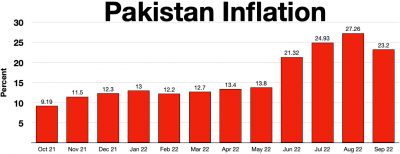By Syed Atiq ul Hassan, Sydney Australia

In just 25 years since its creation, Pakistan has been marred by injustices, discrimination, undemocratic attitudes, and unbalanced rule, leading to the division that birthed Bangladesh from East Pakistan. Unfortunately, the autocratic governance style persists, and today, the remaining part of Pakistan seems to be on a path towards disintegration and chaos.
One particularly troubling aspect is the apparent indifference of the political elite to the dire state of the nation. Many of these leaders possess substantial foreign assets and passports, raising concerns about their commitment to the welfare of the country. The potential flight of these individuals in the event of a complete governmental breakdown casts a dark shadow on the nation’s stability.
Adding to the economic troubles is the disproportionate allocation of funds in the national budget. A significant portion is allocated to the military, surpassing investments in education, healthcare, and essential services. This allocation raises questions about the government’s priorities. In a country where nearly half of the population is under the age of 20s, a skewed budgetary focus poses a hindrance to fostering a sustainable future.
Furthermore, the prevailing inflation rate, exceeding 30 percent, poses a severe threat to the financial well-being of the populace. The dire employment situation and the dismal state of small businesses further compound the challenges faced by ordinary citizens. Shockingly, a significant portion of the population struggles to afford necessities, with one-third unable to secure two meals a day.

Pakistan finds itself at a pivotal moment, where the emerging generation is challenging the outdated and corrupt governance that has long held sway. Unfortunately, the current establishment, power structures, and judiciary appear ill-equipped to effectively steer the nation. In this scenario, two potential outcomes loom on the horizon.
Firstly, irrespective of the results of upcoming elections if happens, a new government may grapple with managing affairs due to financial defaults and increased foreign influence. This could result in external powers exerting control, freezing nuclear and missile technology, and manipulating Pakistan.
Conversely, advocating for fair elections within a system entrenched in oppression and injustices may indicate a lack of awareness about the true intentions of those in control. In a nation where the supreme judge, ruler, and head of state are plagued by dishonesty, falsehoods, bigotry, incompetence, or mental instability, the functionality of the state becomes compromised, leading to inevitable destruction and eventual annihilation.
Presently, a sense of unease pervades Pakistani society, with an increasing trend among the educated youth to seek a safer and more secure future abroad. Economic standing is at its lowest, and governance is marred by systemic issues, guided by individuals often described as scoundrels, crooks, criminals, and oppressors.
However, there is hope in the potential emergence of a grassroots movement led by the younger generation, demanding systemic change. This path may be tumultuous, marked by significant bloodshed, but it could pave the way for a new generation to take charge and implement much-needed reforms.
The crossroads faced by Pakistan demand careful consideration of the potential consequences of each path and a collective effort to steer the nation toward a more stable and prosperous future.
One notable figure in this tumultuous political landscape is Imran Khan, a 70-year-old politician and founder of the Tehreek-e-Insaf (Justice Party), commonly known as PTI. Established in 1996, PTI has gained popularity among the new generation of Pakistanis, particularly those in their 20s, 30s and 40s years of ages.
Imran Khan and his political party, PTI, are viewed by the younger generation of Pakistan as the sole beacon of hope to dismantle the 70 years of corrupt, oppressive, and outdated governing systems.
Despite media restrictions, Mr. Khan and PTI leaders rely on social media and international media outlets, with a significant following among overseas Pakistanis, especially in the West.
Before entering politics, Imran Khan was celebrated as a legendary cricketer. Post his victory in the 1992 Cricket World Cup as the captain of the Pakistan Team, he committed himself to developing the health and education systems in Pakistan. Mr. Khan established a world-ranking Cancer hospital in Lahore and founded three top-tier international standard universities. His social and charity work prior to politics has left a lasting impact among most people of Pakistan.
The political landscape, however, is rife with challenges for Imran Khan. The military-backed caretaker government has devised plans to charge him with fake accusations, including attacks on military venues and installations. Facing over 150 fake cases, Khan’s political voice is stifled within Pakistan’s mainstream media, prompting him to turn to international platforms.
The fate of Pakistan is intricately tied to these developments, and the decisions made at this crossroads will undoubtedly shape the nation’s future. (The writer is a Sydney-based journalist and a political analyst and editor Tribune International, Australia. His email is shassan@tribune-intl.com ).
[END]




